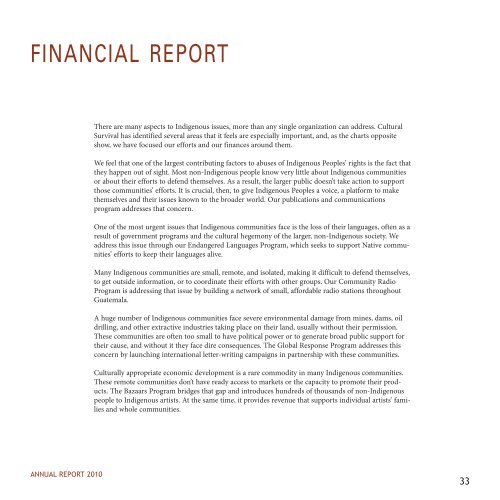Annual Report 2010 - Cultural Survival
Annual Report 2010 - Cultural Survival
Annual Report 2010 - Cultural Survival
You also want an ePaper? Increase the reach of your titles
YUMPU automatically turns print PDFs into web optimized ePapers that Google loves.
FINANCIAL REPORT<br />
ANNUAL REPORT <strong>2010</strong><br />
There are many aspects to Indigenous issues, more than any single organization can address. <strong>Cultural</strong><br />
<strong>Survival</strong> has identified several areas that it feels are especially important, and, as the charts opposite<br />
show, we have focused our efforts and our finances around them.<br />
We feel that one of the largest contributing factors to abuses of Indigenous Peoples’ rights is the fact that<br />
they happen out of sight. Most non-Indigenous people know very little about Indigenous communities<br />
or about their efforts to defend themselves. As a result, the larger public doesn’t take action to support<br />
those communities’ efforts. It is crucial, then, to give Indigenous Peoples a voice, a platform to make<br />
themselves and their issues known to the broader world. Our publications and communications<br />
program addresses that concern.<br />
One of the most urgent issues that Indigenous communities face is the loss of their languages, often as a<br />
result of government programs and the cultural hegemony of the larger, non-Indigenous society. We<br />
address this issue through our Endangered Languages Program, which seeks to support Native communities’<br />
efforts to keep their languages alive.<br />
Many Indigenous communities are small, remote, and isolated, making it difficult to defend themselves,<br />
to get outside information, or to coordinate their efforts with other groups. Our Community Radio<br />
Program is addressing that issue by building a network of small, affordable radio stations throughout<br />
Guatemala.<br />
A huge number of Indigenous communities face severe environmental damage from mines, dams, oil<br />
drilling, and other extractive industries taking place on their land, usually without their permission.<br />
These communities are often too small to have political power or to generate broad public support for<br />
their cause, and without it they face dire consequences. The Global Response Program addresses this<br />
concern by launching international letter-writing campaigns in partnership with these communities.<br />
<strong>Cultural</strong>ly appropriate economic development is a rare commodity in many Indigenous communities.<br />
These remote communities don’t have ready access to markets or the capacity to promote their products.<br />
The Bazaars Program bridges that gap and introduces hundreds of thousands of non-Indigenous<br />
people to Indigenous artists. At the same time, it provides revenue that supports individual artists’ families<br />
and whole communities.<br />
33


